When shopping for a new conservatory, you may already have an idea of how you want it to look and what type of furniture you want to buy. But before you get that far, you need to think about the foundations. The type of flooring you choose will likely impact the overall aesthetics of your new living space.
When it comes to choosing conservatory flooring options, there are a variety of materials to consider. From durable ceramic tiles to elegant hardwood floors, finding the right option for your conservatory can enhance its aesthetic appeal while providing practicality. It’s important to choose a flooring material that can withstand the fluctuating temperatures and humidity levels often found in conservatories.
Types of materials for conservatory flooring
The main types of conservatory flooring are:
- Vinyl flooring
- Floor tiles
- Laminate flooring
- Wooden flooring
- Marble floors
- Carpet
- Cork flooring
Vinyl flooring
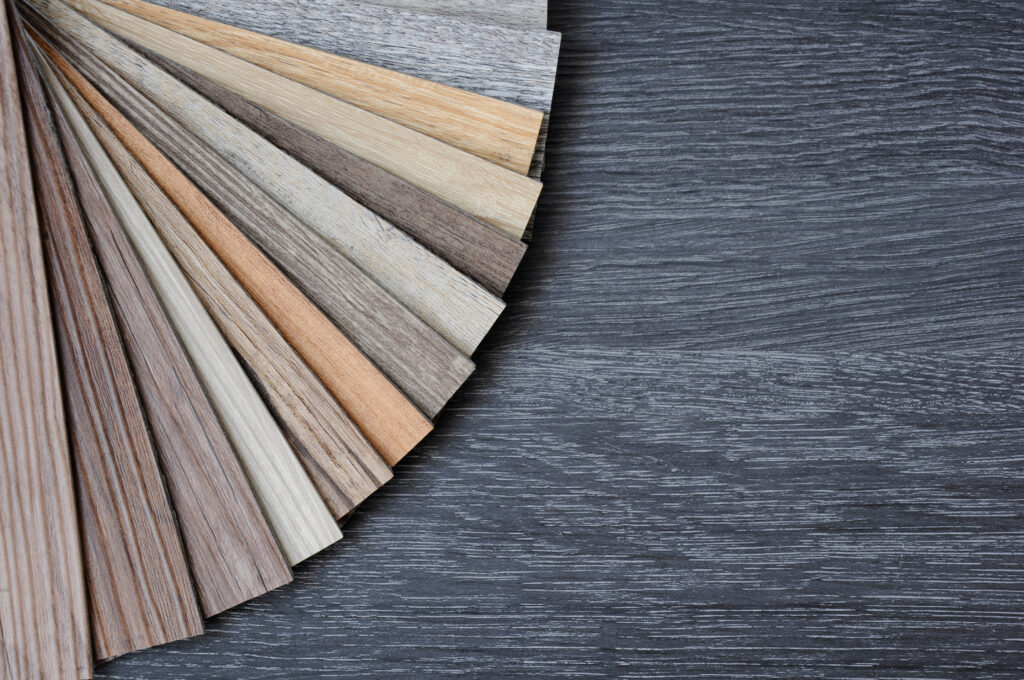
Lifecycle: 10-20 years
Compatible with underfloor heating: Yes
Pet friendly: Somewhat
Maintenance levels: Low
Cost (comparatively): Low
Advantages and disadvantages of vinyl flooring
With so many styles and designs to choose from, vinyl flooring can be an excellent low-cost choice for your conservatory flooring.
Luxury vinyl tiles (LVT) are an extremely popular choice in homes as they are water resistant and incredibly easy to clean – perfect for heavy traffic areas like conservatories.
Vinyl often holds up pretty well against scratches, so if you have pets coming and going you won’t have to worry too much about them damaging your new floors. However, it isn’t puncture resistant, so be careful with cat claws and take care when moving heavy objects around.
It also has to be glued onto the floor, so will be difficult to replace when the time comes (but not impossible). Luckily, vinyl will last for a good couple of decades so that’s not something you will have to worry about for a while.
Floor tiles
Lifecycle: 20-50 years
Compatible with underfloor heating: Some
Pet friendly: Yes
Maintenance levels: Medium
Cost (comparatively): Medium
Advantages and disadvantages of conservatory floor tiles
The price tag on floor tiles will vary depending on your chosen material. Just some of the options include:
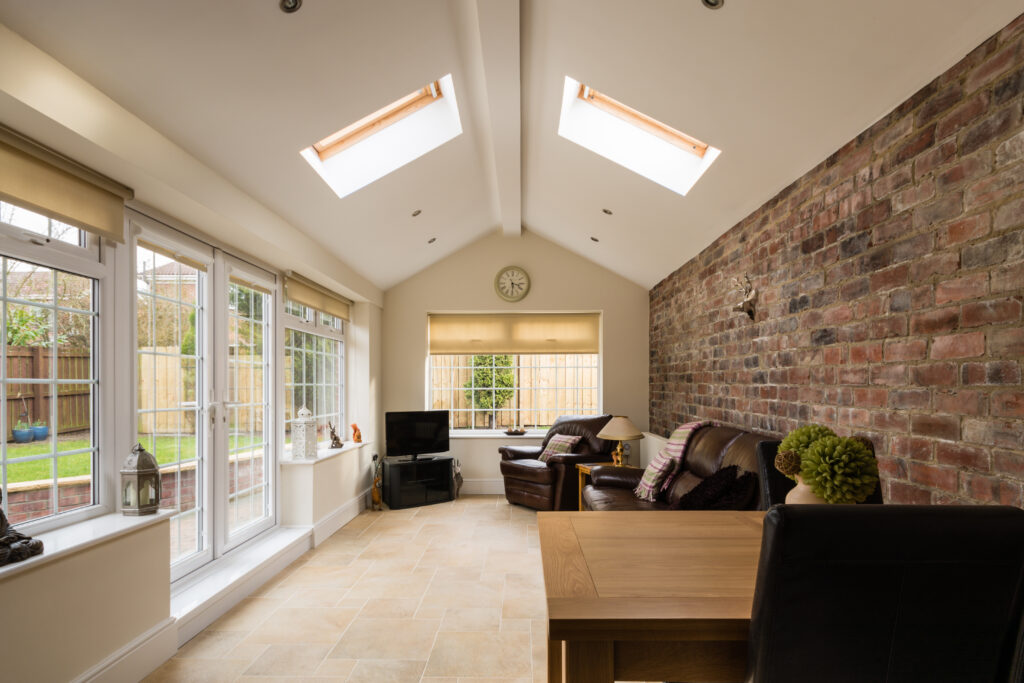
- Ceramic
- Clay
- Glass
- Granite
- Marble
- Porcelain
- Slate
- Vinyl
And more.
You can select something subtle to enhance your conservatory decor or you can buy decorated tiles to act as the main focal point.
They may need a little more care and attention than other options, but maintenance simply involves vacuuming, sweeping and a quick mop twice a month.
If you have pets, keep an eye out for non-scratch tiles to keep them looking pristine through their lifecycle – which could be as long as 50 years!
One drawback is that they will be cold underfoot during the UK winter months. You can bypass this by getting underfloor heating installed, although double-check that it is compatible with the tile material you’ve opted for. Another option is to lay down a rug during chilly weather to help keep your feet toasty warm.
Laminate flooring
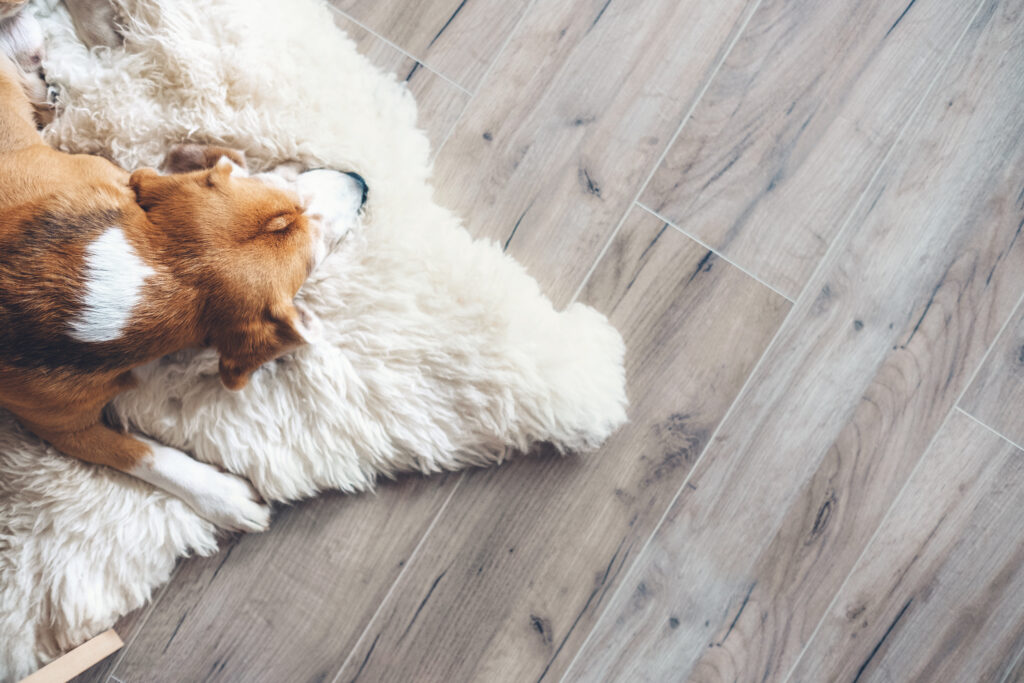
Lifecycle: 15-25 years
Compatible with underfloor heating: Yes
Pet friendly: Yes
Maintenance levels: Low but care needed
Cost (comparatively): Low
Advantages and disadvantages of laminate flooring
Laminate can be a great choice for your conservatory floor as it is well-priced, can last for up to 25 years and is stain, scratch and impact resistant. If you’re looking for a wood effect but don’t want to pay for the material, this is a great cost-effective alternative.
Although with all of its good points, you need to be careful not to get it wet – a careful mop every couple of months should suffice. If water gets into the laminate flooring, it will warp or swell. It can also weaken the glue holding the flooring together.
Wood flooring
Lifecycle: Engineered wood flooring can last almost 50 years. Solid wood flooring has a lifecycle of up to 100 years.
Compatible with underfloor heating: Yes, but engineered wood is recommended.
Pet friendly: Yes but it can be slippery
Maintenance levels: High
Cost (comparatively): High
Advantages and disadvantages of real wood flooring
Talking about the pros and cons of wood flooring could be a post all of its own – due to the wide range of materials to choose from including:
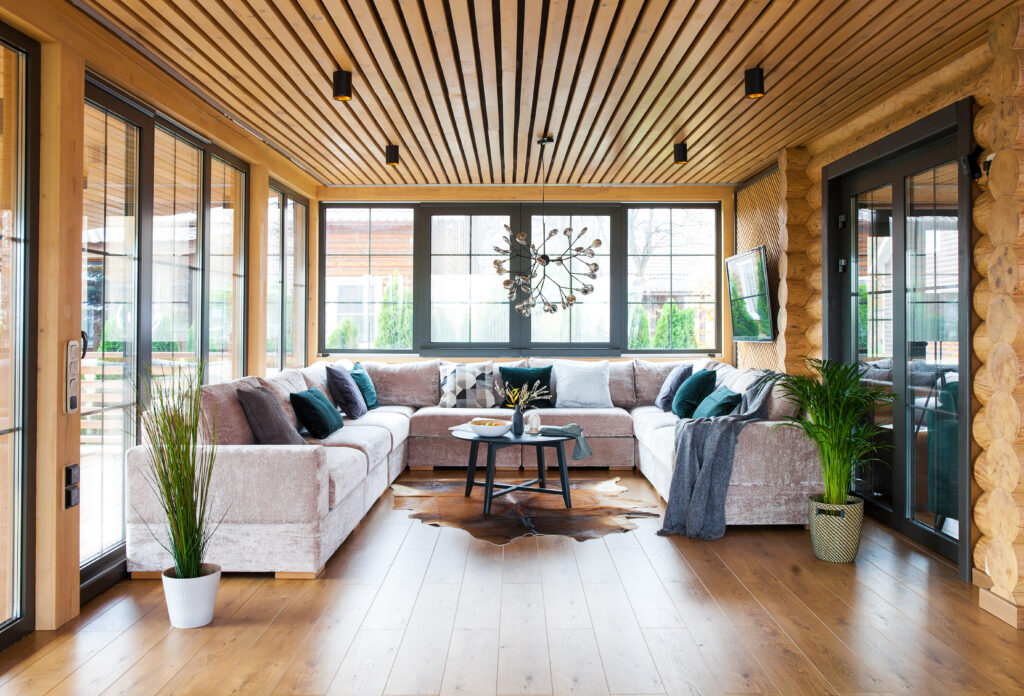
- Engineered wood
- Timber
- Reclaimed wood
- Bamboo
- Solid wood
- Natural wood floors
And more.
If you want real wood floors rather than the wood effect available through laminate flooring for example, look out for options that have UV protection so that the sun flooding through your conservatory windows doesn’t bleach the wood.
While this option is more expensive than others in this list, its longevity if properly cared for is most certainly an advantage.
One disadvantage to be aware of is that wood does not bode well with fluctuating temperature changes. Wood floorboards can warp, buckle or gap – so may not be the best flooring option in your conservatory.
Marble flooring
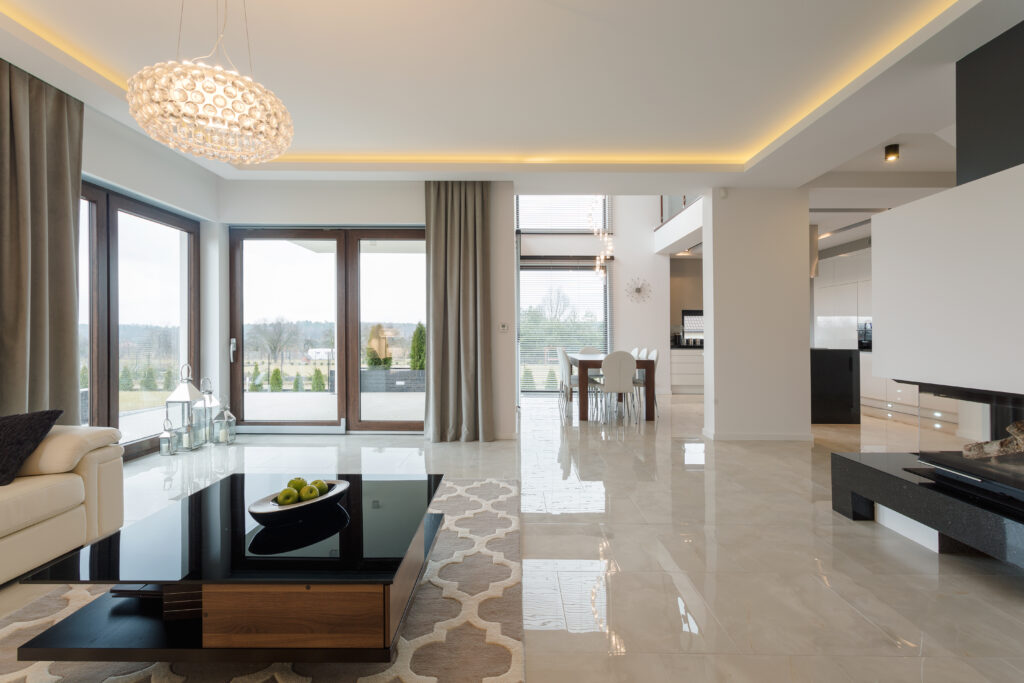
Lifecycle: Up to 20 years
Compatible with underfloor heating: Yes
Pet friendly: No
Maintenance levels: High
Cost (comparatively): High
Advantages and disadvantages of marble conservatory flooring
You may be imagining freezing floors in the winter, but because of marble’s thermal conductivity, it is arguably the best material to pair with underfloor heating.
You may want to choose a different material, however, if you have dogs or cats that will be coming in and out of the house through the conservatory. That’s because the material can get easily scratched under pawprints and it makes for quite a slippery surface.
When it comes to caring for this type of flooring, be sure to clear up any spills immediately – especially if it’s wine, orange juice or anything else that’s acidic. This flooring type will also have to undergo periodic resealing and be cleaned regularly.
While it may not be the most practical flooring for a conservatory that has high traffic levels, we can’t deny that it’s stunning!
Carpet
Lifecycle: 5-15 years
Compatible with underfloor heating: Yes
Pet friendly: Yes
Maintenance levels: Medium
Cost (comparatively): Medium
Advantages and disadvantages of carpet
We will admit that it feels a little strange to install carpet in a conservatory, but it does add that extra layer of comfort. Carpet will probably work best in a conservatory that is joined onto another carpeted room.
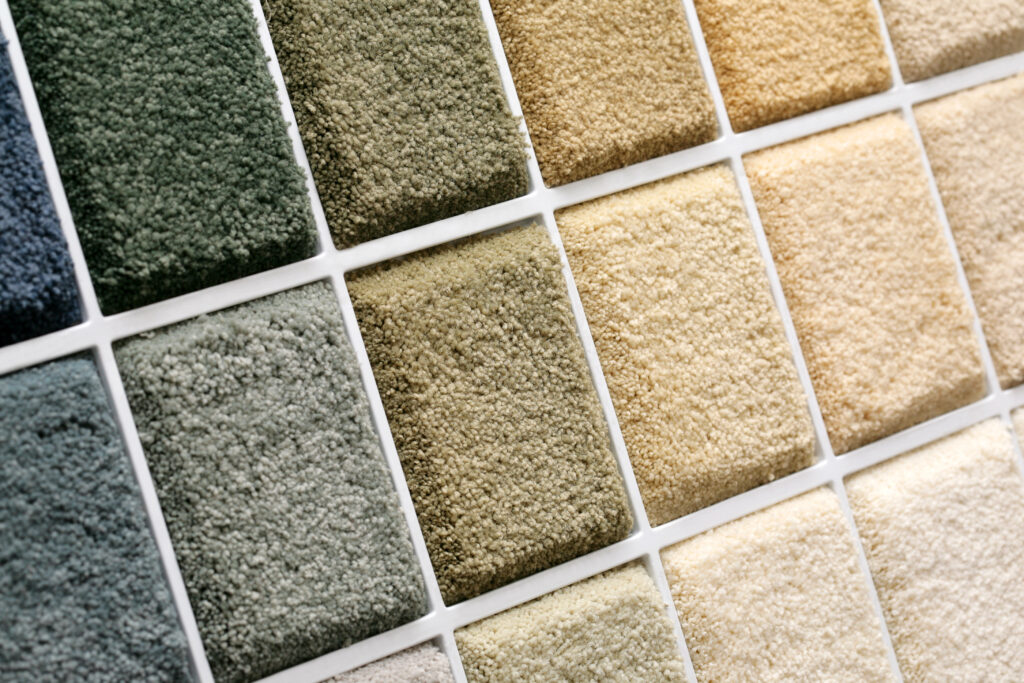
While the material itself is pet friendly, in that it will be soft underfoot (or underpaw) and is more slip resistant than other options mentioned in this post, you may find that your pets aren’t carpet friendly. Cats in particular may use some of the carpet as a scratching post. That doesn’t rule carpets out entirely but it is worth mentioning.
Another issue to look out for is that carpet can be bleached under direct sunlight, particularly if your new conservatory is going to be a sun trap.
Cork flooring
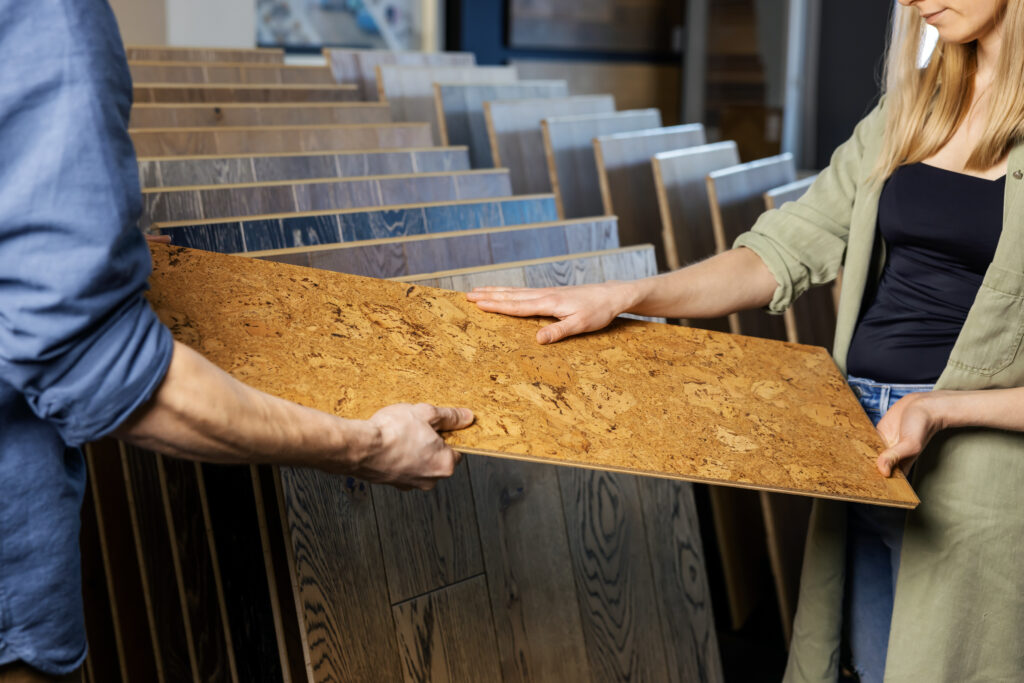
Lifecycle: 40 years or longer
Compatible with underfloor heating: No
Pet friendly: Yes and No
Maintenance levels: Medium
Cost (comparatively): Medium-High
Advantages and disadvantages of cork flooring
Another peculiar floor type but hear us out. Cork is a renewable material, making it the perfect conservatory flooring for people interested in a sustainable lifestyle.
While it means you can’t install underfloor heating in your conservatory, it boasts good insulation. It is also anti-microbial, hypoallergenic and water resistant (although not waterproof!).
Some drawbacks are that pet claws, high heels and more can cause damage, they can be bleached by the sunlight and although they will last for around 40 years or longer, they will need to be recoated every now and then.
Modern Conservatory Flooring Ideas
When it comes to modern conservatory flooring ideas, there are various options to consider. From sleek and durable laminate flooring to elegant and light-colored hardwood, choosing the right flooring can enhance the aesthetic appeal of your conservatory while ensuring practicality and functionality.
And Don’t Forget Rugs Are An Option
If you’re looking for conservatory rug ideas to add warmth and style to your space, consider opting for natural fibres like jute or sisal to create a relaxed and earthy feel. Alternatively, a vibrant and patterned rug can bring a pop of colour and personality to your conservatory, making it a welcoming and cosy retreat all year round.
Like all things in life, there is no ‘best conservatory flooring.’ Your lifestyle, style and budget will all impact your decision.
If you haven’t bought your dream conservatory yet, why not visit our showrooms for some inspiration? From double-hipped, lean-to to Edwardian, victorian conservatories and orangeries, you’re sure to find the perfect conservatory space from our vast selection.


